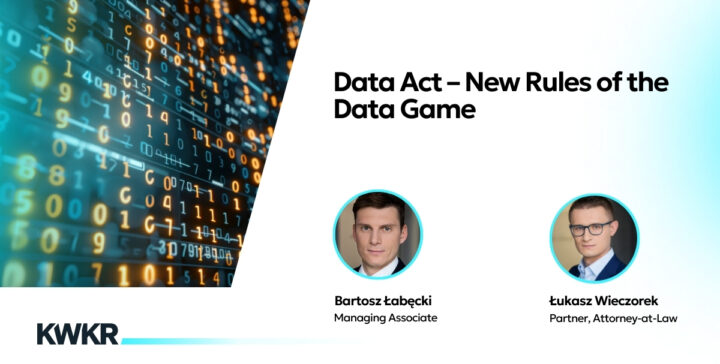Data Act – new rules of the game in the area of data
The Data Act came into force on 12 September 2025. These regulations change the rules of the game in the area of data. On our website, we publish a short text about what they mean for businesses and users. And for those who want a quick overview of the most important changes, we have prepared a 2-pager, i.e. a practical summary of the most important changes.

The Data Act changes the rules of the game in the world of data
Data is increasingly becoming the foundation for business development, as it allows companies to design new services, personalise their offerings and train artificial intelligence algorithms. The problem is that access to this data has often been limited to the device manufacturer or service provider. Users, whether private individuals or businesses, have had little influence over what happens to their data.
The Data Act changes this situation by introducing the principle that data generated by digital devices and services should be available not only to the manufacturer, but also to the user and entities designated by them.
The European Union’s intention is to unlock the potential of data that often remains untapped today. Vast amounts of information generated by digital devices and systems are locked away in manufacturers’ “silos”, when they could be driving innovation across the economy. The Data Act aims to make data more accessible and allow it to circulate more freely between businesses, consumers and administrations.
The EU hopes that this will increase the competitiveness of European companies, develop new business models, and provide fuel for the development of technologies such as artificial intelligence, fintech and Industry 4.0 solutions. In the background, there is also a strategic ambition to build a single data market in Europe that will counterbalance the dominance of global technology giants.
What does this mean for technology providers?
Companies creating IoT devices, applications or cloud services must design them in such a way that data is easily accessible.
This means, among other things:
- the obligation to make data available to the user in a simple and readable format,
- the ability to transfer data to third parties designated by the user,
- in the case of cloud services, facilitating data migration to another provider.
The Data Act provides for sanctions for failure to comply with these obligations. The amount of the penalties will be determined at the national level, but the regulation indicates that they may be severe, comparable to the penalties known from the GDPR. This means that ignoring the obligation to make data available or facilitate migration in the cloud may not only entail reputational risk, but also serious financial consequences.
This is a considerable technical and organisational challenge, but also an opportunity to build a competitive advantage through transparency and customer trust.
What does this mean for users?
The Data Act gives users – both consumers and businesses – real control over the data generated by the devices and systems they use.
In practice, this means, for example, that:
- a factory owner will be able to download data from machines and transfer it to an independent analytical service,
- the driver of a connected car will be able to access operational data and use it at a garage of their choice,
- a smartwatch user will have full access to information about their activity and health and decide that they want to analyse it in an application other than the one proposed by the device manufacturer,
- a household will download data from a smart energy meter and send it to another service provider,
- a farmer will obtain data from IoT sensors in the field and share it with a company that helps optimise yields,
- a logistics company uses data from its fleet vehicles to compare offers from different services or insurers,
- users of smart home appliances – refrigerators, heating or air conditioning – will transfer data to a new control application and avoid being locked into a single manufacturer’s ecosystem.
The result? Greater freedom of choice, the ability to switch providers, and the use of data in ways that were often beyond the reach of users until now.
Areas covered by the Data Act
The regulation applies to, among other things:
- the Internet of Things (IoT), i.e. network-connected devices that generate data during use,
- cloud services – introducing rules for easier migration between providers,
- B2B and B2C relationships – facilitating data exchange between companies and between companies and consumers.
In practice, this means that data becomes a new type of asset that is not “locked in” with the manufacturer, but can circulate more freely and serve the development of various business models.
First steps and subsequent challenges
The Data Act is just getting started. Businesses must adapt their products and processes, and users must learn how to exercise their new rights.
One thing is certain: like the GDPR a few years ago, the Data Act is changing the approach to data across Europe. Except this time, it is not about personal data, but largely about non-personal data such as data from machines, IoT devices or industrial systems.


